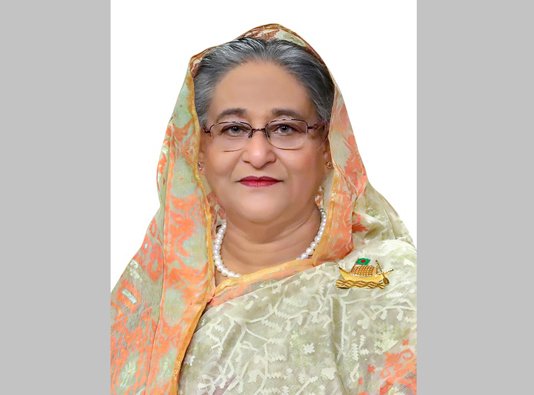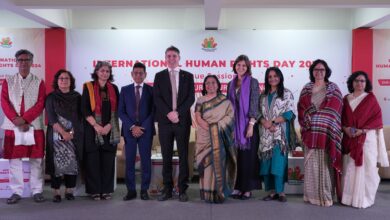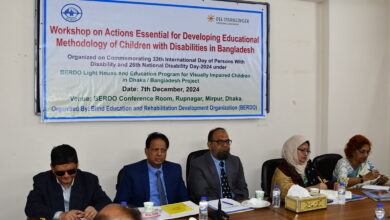Striving to realize ideals of my father, Bangabandhu: Sheikh Hasina

Prime Minister Sheikh Hasina has said she learned from her father –Father of the Nation Bangabandhu Sheikh Mujibur Rahman– how to empathize with the deprived, the disadvantaged, and how to dream about building a prosperous future for them.
“He (Bangabandhu) dreamt about creating, once again, a Sonar Bangla, or Golden Bengal, as our land was known in ancient times. He envisioned a prosperous country based on the ideals of democracy, religious tolerance, and social justice. It ultimately became his political philosophy and lodestar all through his life. I have always tried to follow his advice and example,” she said.
The Prime Minister described this in her article published in the US-based MIT Press Direct, one of the largest and most distinguished university presses in the world.
“Are you going to wear those flashy, expensive sari and jewelry? Most people these days can’t even afford a single meal-do you want to show off how rich you are? Don’t wear them please, wear something simple and ordinary so that you can identify yourself with the poor people of this land,” Sheikh Hasina quoted her father as telling her.
The Prime Minister said that she can never forget those words of her father, Sheikh Mujibur Rahman, the man people fondly called “Bangabandhu”, or Friend of Bangladesh-a title bestowed in the 1960s that reflected how much they loved him. It was not meant to be a lofty title but, rather, a simple reflection of people’s love, she added.
The premier continued, “I learned from my father how to empathize with the deprived, the disadvantaged, and how to dream about building a prosperous future for them.”
Focusing on Bangabandhu’s leading role and dedication in the long and arduous 20-plus year struggle of freedom, sheikh Hasina said people could see these genuine qualities in him, which drew them naturally to him and encouraged them to seek his leadership and guidance.
Since Sheikh Mujib’s call for independence resonated very deeply in the hearts of people, they launched an all-out war against the occupying Pakistani forces, which continued to carry out unimaginable atrocities that can only be described as genocide. Victory came on December 16, 1971, and Bangladesh emerged as an independent and sovereign nation, thus fulfilling the dream her father cherished for a quarter century, said the Prime Minister.
Because of his frequent imprisonment in the past, she and her sister and brothers were deprived of their father’s presence, but never his enduring affection, she said, adding, her mother wholeheartedly supported him through his long political struggles; her mother was also by their side, ensuring that all her children received a proper education.
“We dearly missed our father; his frequent absences only deepened our loyalty to his idealism. We were fully aware that he was absent because of his imprisonment and the reasons for it. His sacrifices made it easier for us to make corresponding sacrifices,” Sheikh Hasina added.
She went on saying that “Our parents taught us about the value of patriotism, and we shared his deep love of the people and his steadfast commitment to the liberation of our land. They made it easier to never lose our way, to never lose hope for a brighter, better future.”
Citing the August 15, 1975 assassination and her return to Bangladesh in 1981, Sheikh Hasina said the pain that came from losing virtually all members of her family in 1975 has been impossible to overcome.
“However, for the welfare of the people of Bangladesh, I have tried to channel my pain from losing my family members into building Bangladesh, the cause for which they perished,” she said.
She highlighted her government’s efforts and steps to meet the people’s basic needs, including agriculture, food and nutrition; health; education and shelter as well as develop infrastructures, protect environment, ensure electricity facilities, make advancement in digitization and modern technology, to ensure social safety net for marginalized groups, develop human resources, and to uplift the overall socio-economic condition and economy of the country.
“Bangladesh is certainly one of the fastest growing economies in Asia. GDP has grown consistently since 2010 at more than 6 pc annually; it exceeded 8pc in 2019, but there has been a small setback due to the pandemic,” she said.
The premier said once in a situation of chronic food deficit, the country is now one of the world’s top three producers of rice, inland fish, and vegetables; it is still rapidly diversifying its crop production.
She said the country is the fifth largest producer of vegetables in the world and the fourth largest in production of freshwater fish. Marine fish output from the Bay of Bengal has also increased in recent years. “We are self-sufficient in livestock and poultry,” Sheikh Hasina said.
She added Bangladesh garments have become popular globally; it was the second largest exporter of ready-made apparel in 2020.
Remittance earnings from expatriates working abroad hit a record US$21 billion in 2020, the eighth highest in the world. The country’s foreign exchange reserve stands at US$47 billion, she said.
Sheikh Hasina said the UN has recently adopted a resolution that Bangladesh will soon graduate from the status of Least Developed Country to a Developing Country.
“This amazing transformation within a decade has taken place neither accidentally nor by a miracle. It has happened because of planned efforts, grassroots initiatives, and the entrepreneurial spirit of our people, who are determined to overcome our adversities. It is the result of hard labor, blood, toil, and tears of enterprising farmers, garment workers, and expatriates abroad. Prudently coordinated and encouraged by the government, it is a result of enterprise, big and small,” she added.
However, during this pandemic, Bangladesh celebrated two major milestones. Last year would have been her father’s 100th birthday, and this year is Bangladesh’s 50th, she said.
Sheikh Hasina remarked that “As I look back at all we have achieved, I can’t help but wish my father could see us now. I know how proud he would be of how far we have come, and I know he would remind us that there is more work to be done. It is the indomitable spirit of Sheikh Mujibur Rahman that drives us forward, and we dare not rest till we achieve all his dreams.”
Source: BSS





